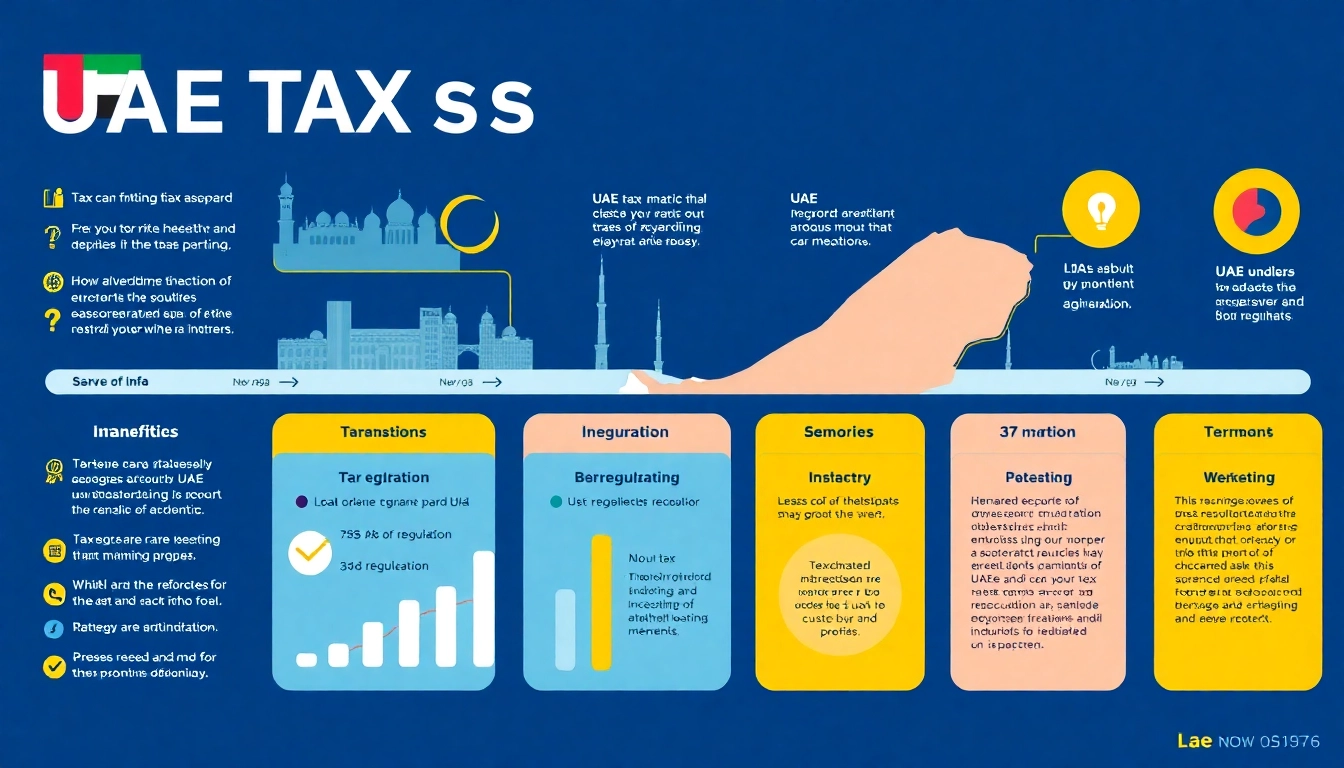Overview of the UAE Tax System
The tax framework in the United Arab Emirates (UAE) presents a unique blend of benefits and complexities, especially for businesses and expatriates. Despite being known as a tax-friendly environment, the introduction of various tax regulations has necessitated a deeper understanding of the system. This overview aims to shed light on the history, types of taxes, and key tax benefits available in the UAE, laying a solid foundation for navigating its intricate tax landscape. For more information about UAE tax implications, individuals and businesses are encouraged to seek professional advice.
History and Evolution of Taxes in the UAE
The modern tax system in the UAE has evolved significantly over the past few decades. Initially, the UAE was known for its non-existent taxation policies, particularly in the context of personal income tax. However, as the country diversified its economy post-oil boom, the government recognized the need for a more structured fiscal approach.
In 2018, the introduction of Value Added Tax (VAT) marked a significant milestone. This tax was implemented to supplement the country’s income in the wake of fluctuating oil prices and to align with international norms. Since then, more regulatory frameworks have been established, including corporate taxes introduced in select emirates. This evolution indicates the UAE’s responsive adaptation to global economic changes while striving to maintain its appeal as a business hub.
Types of Taxes Applicable in the UAE
The UAE’s tax system comprises various types of taxes, each serving specific purposes. Here are the major tax types:
- Corporate Tax: On June 1, 2023, the UAE implemented a federal corporate tax. Businesses with profits exceeding a threshold are required to pay a tax rate of 9%.
- Value Added Tax (VAT): Since its introduction in 2018, VAT is applied at a standard rate of 5% on most goods and services, designed to generate revenue while remaining low compared to global standards.
- Excise Tax: This tax applies to specific goods that are considered harmful to human health and the environment, including tobacco products and sugary drinks.
- Municipality Tax: This is levied on rental properties, depending on the emirate, and can vary based on property value.
Key Tax Benefits for Businesses
One of the primary attractions for businesses operating in the UAE is the array of tax benefits available:
- No Personal Income Tax: Individuals are not subject to personal income tax, allowing for greater disposable income.
- Free Zones: Many free zones offer tax incentives, including exemptions from corporate tax and customs duties for a specified period, fostering business and investment.
- Foreign Ownership: Businesses can enjoy 100% foreign ownership in certain sectors, enhancing investment opportunities.
UAE Tax Regulations for Businesses
Corporate Tax Obligations and Rates
As of June 2023, the UAE implemented a corporate tax structure aimed at generating revenue and aligning with global tax standards. The basic tax rate is 9% on profits exceeding AED 375,000, while businesses earning less than this threshold are exempt. This corporate tax is a significant shift for many businesses that previously enjoyed a tax-free status.
It is essential for businesses to understand their registration obligations and the sectors that may be exempt from this tax. Thorough documentation and compliance will be critical to avoid potential penalties.
Understanding VAT in the UAE
Value Added Tax (VAT) in the UAE is a consumption tax that has implications for both businesses and consumers. A well-structured VAT system helps to diversify government revenue and promote sustainable economic growth.
Businesses must register for VAT if their taxable supplies and imports exceed AED 375,000 annually. The 5% VAT is applicable on most goods and services, and companies must ensure accurate reporting and remittance of VAT to the Federal Tax Authority (FTA) to comply with regulations and avoid fines.
Compliance Requirements and Best Practices
Maintaining compliance under the UAE tax framework requires diligence and adherence to various regulatory practices. Local authorities mandate accurate record-keeping, timely tax submissions, and adherence to prescribed reporting formats.
Best practices for compliance include:
- Regular Audits: Conducting internal audits can help identify discrepancies before they attract penalties.
- Engaging Tax Professionals: Enlisting the services of experienced tax consultants can provide clarity on complex regulations.
- Training Staff: Regular training for financial staff on tax regulations can prevent errors in reporting.
UAE Tax Considerations for Expats
Personal Income Tax Overview
One of the most attractive features of the UAE tax system for expatriates is the absence of personal income tax. This allows individuals to retain a larger portion of their income compared to countries with higher tax rates.
However, expatriates must be aware of their tax liabilities in their home countries, especially if they are residents of jurisdictions that levy taxes based on worldwide income. Understanding these dynamics is essential for effective personal financial planning.
Tax Residency: Who Qualifies?
Tax residency in the UAE is determined based on a number of factors, including the duration of stay. Individuals are classified as tax residents if they stay in the UAE for 183 days or more within a 12-month period. This classification can impact individual obligations regarding income earned worldwide.
Expatriates taking up employment or business activities may also be eligible for residency visas, which can further affect their tax status. It’s important to consult with tax advisors to ensure compliance and optimal arrangements.
Strategies for Tax Efficiency as an Expat
Expatriates can adopt several strategies to enhance tax efficiency while living in the UAE:
- Understanding Double Taxation Agreements (DTAs): The UAE has many DTAs with various countries that can help mitigate double taxation.
- Investment Planning: Utilizing tax-efficient investment avenues can yield higher returns without attracting excess taxation.
- Retirement Planning: Exploring retirement savings plans that benefit from tax advantages can be instrumental for long-term financial stability.
Challenges in Complying with UAE Tax Laws
Common Pitfalls for New Businesses
New businesses often face several challenges in navigating the UAE tax landscape. Lack of familiarity with the local regulatory environment can lead to significant compliance issues. Common pitfalls may include:
- Failure to Register: New businesses sometimes neglect to register for VAT or corporate tax, resulting in fines and penalties.
- Inadequate Record Keeping: Poor record-keeping practices can lead to inaccuracies in tax returns, causing compliance headaches.
- Not Seeking Guidance: Businesses often underestimate the benefits of professional advice to navigate new regulations.
Navigating Regulatory Changes
The UAE tax framework is subject to ongoing changes, reflective of the country’s economic strategy and international commitments. Companies must stay informed about these changes to remain compliant.
Establishing a network of legal and tax advisors can be advantageous in understanding and adapting to new regulations effectively. Regular updates from the FTA and participation in professional networks can provide critical information that may impact business operations.
Working with Tax Consultants in the UAE
Tax consultants play a vital role in helping businesses and expatriates navigate the complex tax landscape in the UAE. Their services encompass a range of functions, including:
- Tax Planning: Consultants provide insights on how to structure affairs in a tax-efficient manner.
- Compliance Services: They assist in meeting compliance requirements, ensuring accurate filings and submissions.
- Dispute Management: In cases of tax disputes, consultants can represent clients and mediate with tax authorities.
Future Trends in the UAE Tax Landscape
Impact of Global Tax Changes on the UAE
Global tax changes greatly influence the UAE’s tax policies. With initiatives such as the Base Erosion and Profit Shifting (BEPS) by the OECD, countries are increasingly focusing on ensuring fair taxation of multinational entities.
The UAE is likely to adapt its regulations to comply with international standards while retaining its competitive edge. Continuous monitoring of global trends will be crucial for businesses operating in the UAE and for expatriates managing their tax affairs.
Anticipated Reforms in Tax Structure
As the fiscal landscape evolves, businesses can anticipate reforms directed at enhancing transparency and compliance. The government is likely to focus on improving the taxation framework to ensure that it reflects the economic developments and progresses with the changing global tax environment.
Reforms may include adjustments in rates, the introduction of new tax types, or the expansion of existing tax relief measures to support local businesses.
Opportunities Arising from a Changing Tax Climate
The shifting tax landscape provides numerous opportunities for businesses and expatriates in the UAE:
- Enhanced Fiscal Responsibility: Evolving regulations can encourage businesses to adopt more responsible fiscal practices, leading to better financial health.
- Innovation and Growth: The need to adapt provides an impetus for innovation, driving companies to enhance products and services.
- Investment Attraction: A transparent and coherent tax structure may attract more foreign investment, fostering economic growth.
In conclusion, understanding the nuances of the UAE tax system is essential for both businesses and expatriates to navigate current regulations and prepare for future changes. Proactive engagement with tax professionals and continuous education on the evolving tax landscape can provide the strategic advantage necessary to thrive in the UAE’s dynamic economic environment.






